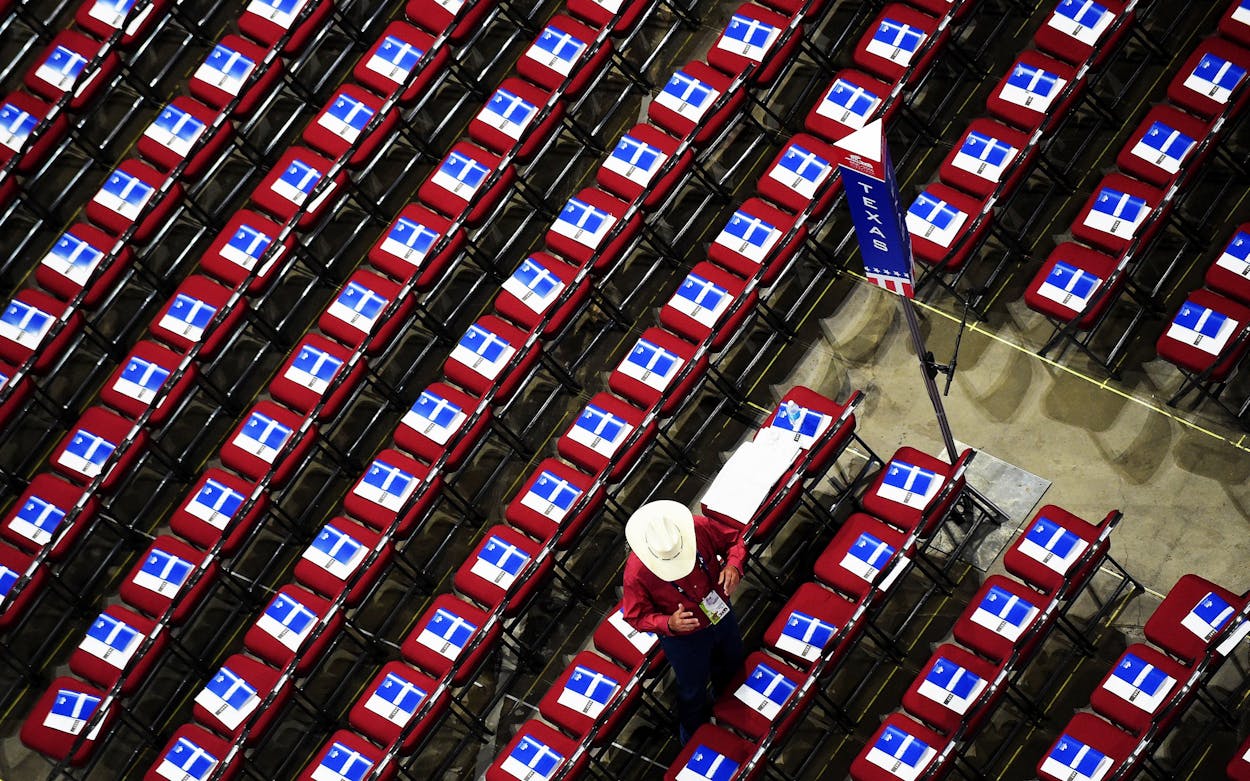On June 6, Bill Baker, a longtime GOP activist, attended the Kaufman County Republican Party convention, at a church in the town of Talty, thirty minutes outside Dallas. There, a handful of party faithful gathered in preparation for the statewide party convention in Houston next month. Figures like Baker make the Texas GOP run at its most fundamental level. He had been a party activist for twenty years, he wrote on his Facebook page in March, seven of which he had served as the chairman of the Kaufman County GOP. This year’s county convention was one of many local and state conventions he had been to over the years, but it would also be his last. On June 11, Baker was admitted to the hospital. He had contracted COVID-19. On June 25, while being intubated, he had a heart attack and died. He was 75.
We don’t know if Baker caught the virus at the GOP meeting. (The average incubation time for the virus is five to six days, scientists say.) But Baker’s sad death, reported on Friday by the local news website inForney.com, is worth noting because the Republican Party of Texas seems hell-bent on holding a much bigger convention of more than seven thousand delegates next month in Houston, which is a national epicenter of COVID-19. At the three-day convention, slated to start on July 16, thousands of activists like Baker will convene at the George R. Brown Convention Center downtown to handle the party’s business. As they eat and drink, they’ll come into contact with thousands of service employees around Houston.
It seems like a pretty bad idea. The Texas Democratic party held a virtual convention last month to protect the lives of its own members and the public. But prominent Republican officials in the party like Governor Greg Abbott have so far given the GOP gathering the green light, even as Harris County Judge Lina Hidalgo has expressed mounting alarm about the situation in Houston. Is the party playing with the lives of its rank and file? Republican party officials say they’re instituting safety measures, like installing abundant hand-sanitizing stations, although they’ve so far declined to make masks mandatory. (It’s unclear how they would even enforce a mask mandate; many party loyalists are opposed to masks on principle and leaders can’t exactly throw their own delegates out of the building.)
Republican leaders face another difficulty: even if they take the virus seriously, members of the party may not. Consider Baker’s apparent views: as the crisis progressed, Baker became a vocal advocate of the idea that the virus didn’t pose much of a threat to Texas, at least judging from his Facebook page. “Looks like living on top of each other isn’t advisable,” he wrote in May about the 43,000 deaths in New York.
He compared the death toll of COVID-19 (about nine thousand Americans at the time) with the 2 million Americans who die every year of heart disease. On May 10, he wrote that it was insane to “shut everything down” when, by his math, just 0.00003 percent of the population of Texas had so far died, and became a vigorous proponent of getting the state “back to work.” And when he died, the Kaufman County party announced Baker’s death by saying only that he had a “heart attack.”
Baker’s death is a tragedy: He was a well-respected figure in North Texas Republican politics as well as a father and grandfather. A lot of the Republicans in Houston next month will be someone’s parent or grandparent. Those who decide to attend may not think they have anything to worry about either, but their loved ones might hope the party judges discretion to be the better part of valor.
- More About:
- Politics & Policy








